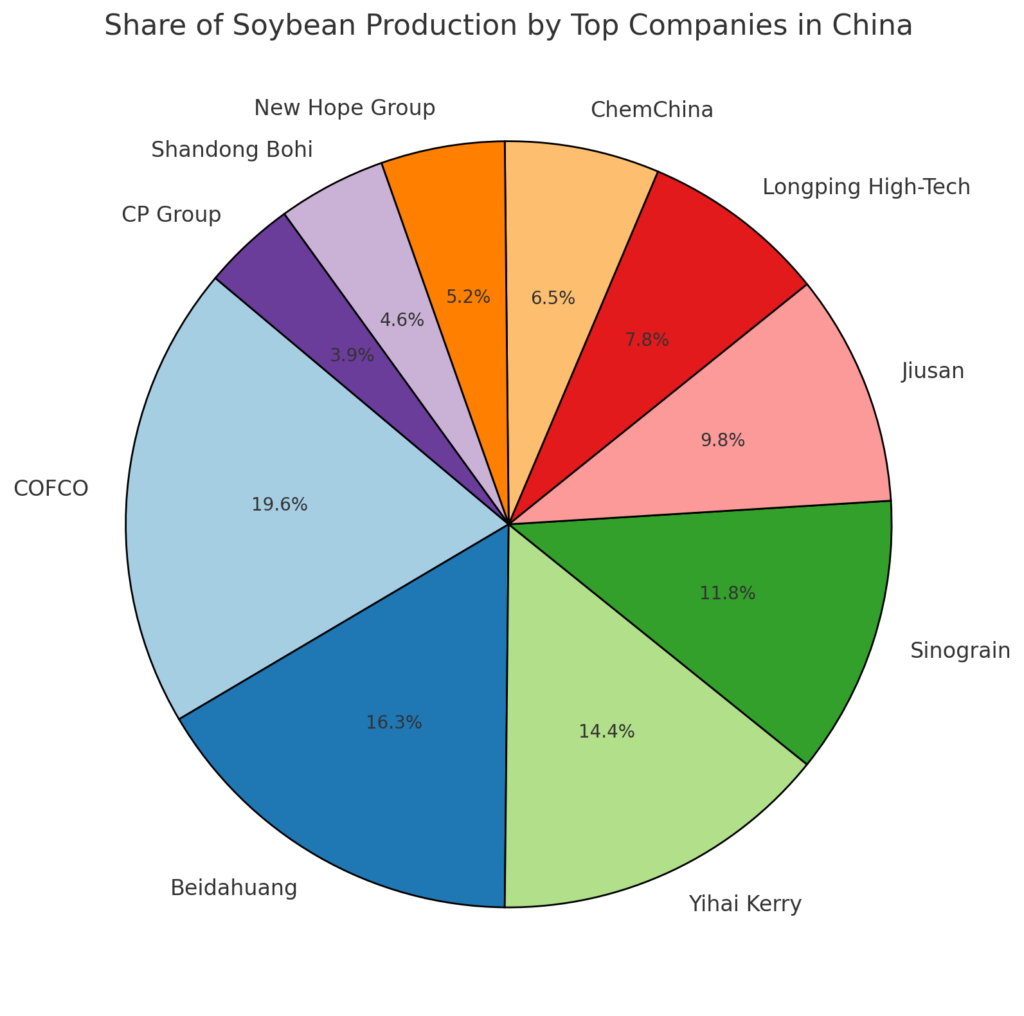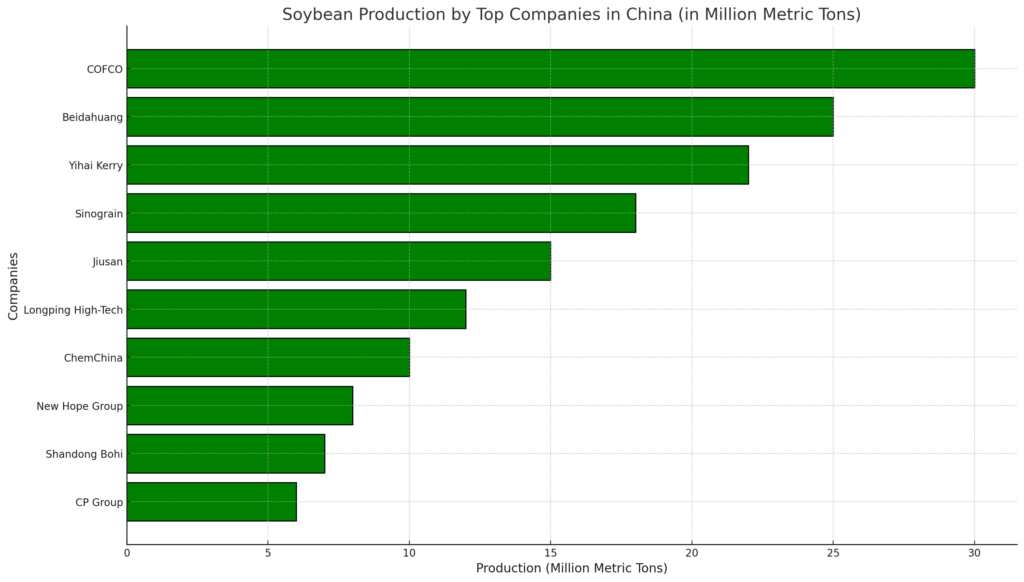
China is the fourth-largest soybean producer in the world, with a growing focus on increasing domestic production to meet the needs of its vast population and reduce dependence on imports. The soybean industry in China is led by major agribusinesses that contribute to food security and industrial applications. This report highlights the top 10 soybean-producing companies in China, their operations, and their role in the agricultural sector.

1. COFCO Corporation
- Headquarters: Beijing, China
- Overview: COFCO is China’s largest agribusiness company and a leader in soybean production and processing.
- Key Highlights:
- Operates extensive soybean farming and processing facilities.
- Focuses on producing soybean oil and meal for domestic consumption.
- Invests heavily in sustainable and eco-friendly farming practices.
2. Beidahuang Group
- Headquarters: Harbin, Heilongjiang Province
- Overview: Beidahuang is a major state-owned enterprise specializing in large-scale soybean farming.
- Key Highlights:
- Operates extensive soybean farms in the fertile Heilongjiang region.
- Focuses on high-yield, genetically modified soybeans.
- Plays a critical role in China’s food security initiatives.
3. Yihai Kerry (Wilmar International)
- Headquarters: Shanghai, China
- Overview: Yihai Kerry is a subsidiary of Wilmar International, focusing on soybean processing and oil production.
- Key Highlights:
- Processes millions of tons of soybeans annually for oil and meal production.
- Supplies soy products to both domestic and export markets.
- Emphasizes sustainability and reducing environmental impact.
4. Sinograin
- Headquarters: Beijing, China
- Overview: Sinograin manages China’s grain and oil reserves, playing a significant role in soybean production and storage.
- Key Highlights:
- Operates soybean farms and storage facilities across China.
- Focuses on ensuring a stable domestic supply of soybeans.
- Works closely with the government to support food security goals.
5. Jiusan Group
- Headquarters: Harbin, Heilongjiang Province
- Overview: Jiusan is a leading soybean processor and oil producer in China.
- Key Highlights:
- Operates advanced soybean crushing plants in key producing regions.
- Supplies soybean oil and meal to domestic food and feed industries.
- Invests in technology to improve processing efficiency and reduce waste.
6. Longping High-Tech Agriculture Co.
- Headquarters: Changsha, Hunan Province
- Overview: Longping High-Tech is a leading agricultural biotechnology company specializing in soybean seed development.
- Key Highlights:
- Develops high-yield and disease-resistant soybean seed varieties.
- Supports farmers with modern agricultural technologies and training.
- Focuses on increasing soybean yields through precision farming.
7. China National Chemical Corporation (ChemChina)
- Headquarters: Beijing, China
- Overview: ChemChina plays a key role in providing agricultural solutions, including soybean production inputs.
- Key Highlights:
- Supplies fertilizers, pesticides, and herbicides for soybean farming.
- Operates research facilities to improve soybean farming practices.
- Works on integrating sustainability into soybean production.
8. New Hope Group
- Headquarters: Chengdu, Sichuan Province
- Overview: New Hope Group is a major agribusiness involved in soybean processing for feed and oil production.
- Key Highlights:
- Processes soybeans into meal for animal feed, particularly for poultry and livestock.
- Expands operations to meet growing demand in China’s food industry.
- Emphasizes sustainable supply chain practices.
9. Shandong Bohi Industry Co., Ltd.
- Headquarters: Binzhou, Shandong Province
- Overview: Shandong Bohi specializes in soybean crushing and oil production.
- Key Highlights:
- Operates large-scale processing facilities in northern China.
- Produces soybean oil and meal for both domestic use and exports.
- Invests in advanced crushing technology for efficiency and quality.
10. Chia Tai Group (CP Group China)
- Headquarters: Shanghai, China
- Overview: CP Group is a diversified agribusiness with significant investments in soybean processing.
- Key Highlights:
- Processes soybeans for animal feed and edible oil.
- Operates facilities in key soybean-producing regions.
- Focuses on integrating technology and sustainability in operations.

Contributions of China’s Soybean Producers
- Food Security: These companies ensure a stable supply of soybeans for domestic food and feed industries.
- Innovation: Investment in biotechnology and modern farming practices enhances productivity.
- Economic Impact: Soybean production supports rural economies and provides millions of jobs.
Challenges Facing China’s Soybean Industry
- Import Dependence: China relies heavily on soybean imports to meet domestic demand.
- Land Constraints: Limited arable land poses challenges to increasing soybean production.
- Climate Vulnerabilities: Changing weather patterns affect soybean yields.
Opportunities for Growth
- Biotechnology: Expanding the use of genetically modified soybeans to improve yields.
- Sustainability: Strengthening eco-friendly farming practices to meet global standards.
- Market Expansion: Increasing exports of soybean products like oil and meal to neighboring countries.
Conclusion
China’s top soybean-producing companies, including COFCO, Beidahuang, and Yihai Kerry, are critical to the nation’s agricultural landscape. By leveraging advanced technologies, government support, and sustainability initiatives, these companies contribute to China’s food security and global agricultural trade. As demand for soybeans grows, China’s agribusinesses are well-positioned to adapt and thrive.



